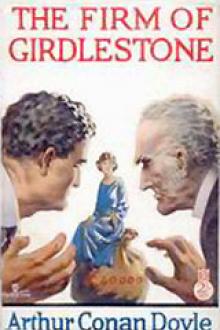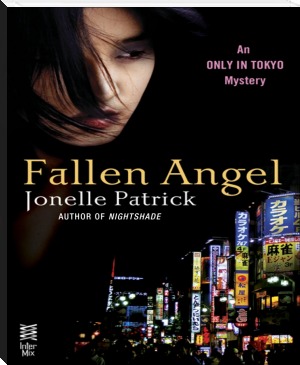The Firm of Girdlestone - Arthur Conan Doyle (free ebook novel .TXT) 📗

- Author: Arthur Conan Doyle
- Performer: -
Book online «The Firm of Girdlestone - Arthur Conan Doyle (free ebook novel .TXT) 📗». Author Arthur Conan Doyle
"There's some one coming towards us," he cried.
Ezra and the troopers halted their panting steeds. Through the uncertain light they saw a solitary horseman riding down the road. At first they had thought that it might possibly be one of the fugitives who had turned, but as he came nearer they perceived that it was a stranger. His clothes were so dusty and his horse so foam-flecked and weary that it was evident that he also had left many a long mile of road behind him.
"Have you seen three men on horseback?" cried Ezra as he approached.
"I spoke to them," the traveller answered. "They are about half a mile ahead."
"Come on! Come on!" Ezra shouted.
"I am bringing news from Jagersfontein—" the man said.
"Come on!" Ezra interrupted furiously; and the horses stretched their stiff limbs into a feeble lumbering gallop. Ezra and the sergeant shot to the front, and the others followed as best they might. Suddenly in the stillness they heard far away a dull rattling sound like the clatter of distant castanets. "It's their horses' hoofs!" cried Ezra; and the troopers behind raised a cheer to show that they too understood the significance of the sound.
It was a wild, lonely spot, where the plain was bare even of the scanty foliage which usually covered it. Here and there great granite rocks protruded from the brown soil, as though Nature's covering had in bygone days been rent until her gaunt bones protruded through the wound. As Ezra and the sergeant swept round a sharp turn in the road they saw, some little way ahead of them, the three fugitives, enveloped in a cloud of dust. Almost at the same moment they heard a shout and crash behind them, and, looking round, saw a confused heap upon the ground. The horse of the leading trooper had fallen from pure fatigue, and had rolled over upon its rider. The other trooper had dismounted, and was endeavouring to extricate his companion.
"Let us see if he is hurt," the sergeant cried.
"On! on!" shouted Ezra, whose passion was increased by the sight of the thieves. "Not a foot back."
"He may have broken his neck," grumbled the sergeant, drawing his revolver. "Have your pistol ready, sir. We shall be up with them in a few minutes, and they may show fight."
They were up with them rather sooner than the policeman expected. Farintosh, finding that speed was of no avail, and that the numbers of his pursuers was now reduced to two, had recourse to strategy. There was a sharp turn in the road a hundred yards ahead, and on reaching it the three flung themselves off their horses and lay down behind cover. As Ezra and the sergeant, the grey horse and the bay, came thundering round the curve, there was a fierce splutter of pistol shots from amongst the bushes, and the grey sank down upon its knees with a sobbing moan, struck mortally in the head. Ezra sprang to his feet and rushed at the ambuscade, while the sergeant, who had been grazed on the cheek by the first volley, jumped from his horse and followed him. Burt and Farintosh met them foot to foot with all the Saxon gallantry which underlies the Saxon brutality. Burt stabbed at the sergeant and struck him through the muscle of the neck. Farintosh fired at the policeman, and was himself shot down by Ezra. Burt, seeing his companion fall, sprang past his two assailants with a vicious side blow at the merchant, and throwing himself upon the sergeant's horse, regardless of a bullet from the latter's revolver, he galloped away, and was speedily out of range. As to Williams, from the beginning of the skirmish he had lain face downwards upon the ground, twisting his thin limbs about in an agony of fear, and howling for mercy.
"He's gone!" Ezra said ruefully, gazing after the fugitive. "We have nothing to go after him with."
"I'm well-nigh gone myself," said the policeman, mopping up the blood from his stab, which was more painful than dangerous. "He has given me a nasty prod."
"Never mind, my friend, you shall not be the loser. Get up, you little viper!"—this to Williams, who was still writhing himself into the most extraordinary attitudes.
"Oh, please, Mr. Girdlestone," he cried, clutching at Ezra's boots with his long thin fingers, "it wasn't me that hit you. It was Mr. Burt. I had nothing to do with robbing you either. That was Mr. Farintosh. I wouldn't have gone with him, only I knew that he was a clergyman, so I expected no harm. I am surprised at you, Mr. Farintosh, I really am. I'm very glad that Mr. Girdlestone has shot you."
The ex-parson was sitting with his back against a gnarled stump, which gave him some support. He had his hand to his chest, and as he breathed a ghastly whistling sound came from the wound, and spirts of blood rushed from his mouth. His glazed eyes were fixed upon the man who had shot him, and a curious smile played about his thin lips.
"Come here, Mr. Girdlestone," he croaked; "come here."
Ezra strode over to him with a face as inexorable as fate.
"You've done for me," said Farintosh faintly. "It's a queer end for the best man of his year at Trinity—master of arts, sir, and Jacksonian prizeman. Not much worth now, is it? Who'd have thought then that I should have died like a dog in this wilderness? What's the odds how a man dies though. If I'd kept myself straight I should have gone off a few years later in a feather bed as the Dean of St. Patrick's may be. What will that matter? I've enjoyed myself"—the dying man's eyes glistened at the thought of past dissipations. "If I had my time to do over again," he continued, "I'd enjoy myself the same way. I'm not penitent, sir. No death-bed snivelling about me, or short cuts into heaven. That's not what I wanted to say though. I have a choking in the throat, but I dare say you can hear what I am driving at. You met a man riding towards Jacobsdal, did you not?"
Ezra nodded sullenly.
"You didn't speak to him? Too busy trying to catch yours truly, eh? Will you have your stones back, for they are in the bag by my side, but they'll not be very much good to you. The little spec won't come off this time. You don't know what the news was that the man was bringing?"
A vague feeling of impending misfortune stole over Ezra. He shook his head.
"His news was," said Farintosh, leaning up upon his hand, "that fresh diamond fields have been discovered at Jagersfontein, in the Orange Free State. So Russia, or no Russia, stones will not rise. Ha! ha! will not rise. Look at his face! It's whiter than mine. Ha! ha! ha!" With the laugh upon his lips, a great flow of blood stopped the clergyman's utterance, and he rolled slowly over upon his side, a dead man.
CHAPTER XXIII. A MOMENTOUS RESOLUTION.During the months which Ezra Girdlestone had spent in Africa the affairs of the firm in Fenchurch Street had been exceedingly prosperous. Trade upon the coast had been brisker than usual, and three of the company's ships had come in at short intervals with excellent cargoes. Among these was the Black Eagle which, to the astonishment of Captain Hamilton Miggs and the disgust of his employer, had weathered a severe gale in the Channel, and had arrived safe and sound once more. This run of luck, supplemented by the business capacity of the old merchant and the indomitable energy of young Dimsdale, made the concern look so flourishing that the former felt more than ever convinced that if he could but stave off the immediate danger things would soon right themselves. Hence he read with delight the letters from Africa, in which his son narrated the success of the conspiracy and the manner in which the miners had been hoodwinked. The old man's figure grew straighter and his step more firm as the conviction grew upon him that the company would soon return once again to its former condition of affluence.
It may be imagined, therefore, that when the rumours of a bona fide diamond find in the Orange Free State came to his ears John Girdlestone was much agitated and distressed. On the same day that he saw the announcement in the papers he received a letter from his son announcing the failure of their enterprise. After narrating the robbery, the pursuit, the death of Farintosh, and the announcement of the new discovery, it gave an account of his subsequent movements.
"There was no doubt about the truth of the scoundrel's words," he said, "for when we went to the nearest farm to get some food and have the sergeant's wound dressed we found that every one was talking about it. There was a chap there who had just come from the State and knew all about it. After hearing the details from him I saw that there was no doubt of the genuineness of the thing.
"The police rode back to Jacobsdal with Williams, and I promised to come after them; but when I came to think it over it didn't seem good enough. The fact of my having so many diamonds would set every tongue wagging, and, again, the sergeant had heard what Farintosh said to me, so it was very possible that I might have the whole district about my ears. As it was, I had the stones and all my money in the bag. I wrote back to the hotel, therefore, telling the landlord to send on my traps to Cape Town by mail, and promising to settle my bill with him when I received them. I then bought a horse and came straight south. I shall take the first steamer and be with you within a few days of your receiving this.
"As to our speculation, it is, of course, all up. Even when the Russian business proves to be a hoax, the price of stones will remain very low on account of these new fields. It is possible that we may sell our lot at some small profit but it won't be the royal road to a fortune that you prophesied, nor will it help the firm out of the rut into which you have shoved it. My only regret in leaving Africa like this is that that vermin Williams will have no one to prosecute him. My head is almost well now."
This letter was a rude shock to the African merchant. Within a week of the receipt of it his son Ezra, gloomy and travel-stained, walked into the sanctum at Fenchurch Street and confirmed all the evil tidings by word of mouth. The old man was of too tough a fibre to break down completely, but his bony hands closed convulsively upon the arms of the chair, and a cold perspiration broke out upon his wrinkled forehead as he listened to such details as his son vouchsafed to afford him.
"You have your stones all safe, though?" he stammered out at last.
"They are in my box, at home," said Ezra, gloomy and morose, leaning against the white marble mantelpiece. "The Lord knows what they are worth! We'll





Comments (0)